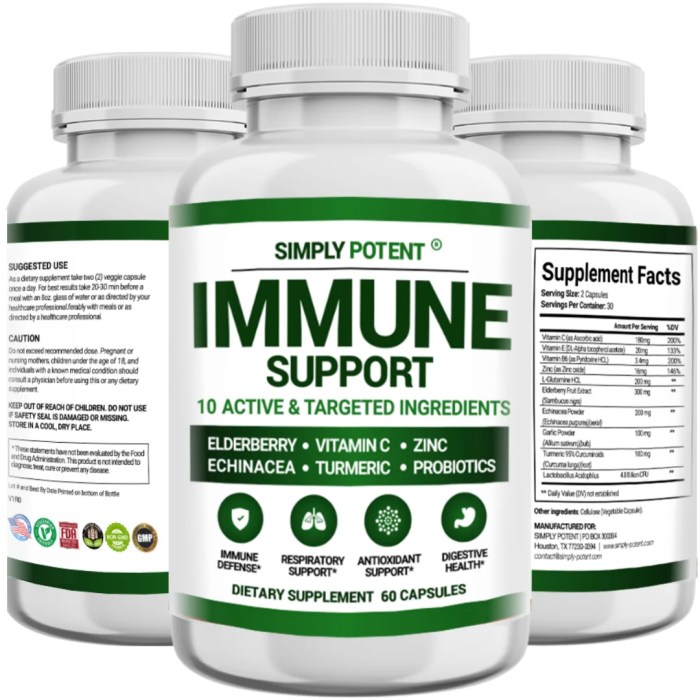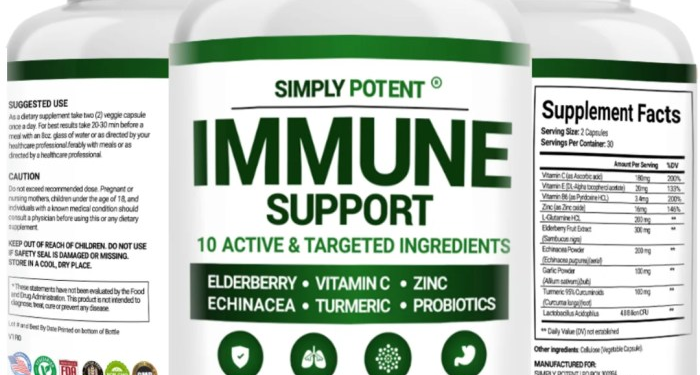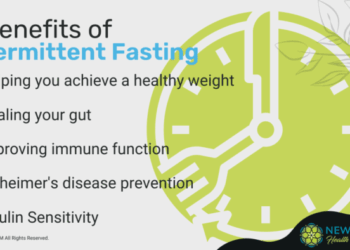Embark on a journey to explore the best supplements for immune system support, essential for maintaining overall health and well-being. Discover how these powerful nutrients can enhance your body's defense mechanisms and keep illnesses at bay.
Delve deeper into the realm of immune system support and uncover the secrets to a stronger, more resilient you.
Importance of Immune System Support
Supporting the immune system is crucial for overall health as it plays a vital role in protecting the body against harmful pathogens such as bacteria, viruses, and other invaders. A strong immune system helps the body to defend itself and maintain optimal health.
Protection Against Illnesses
- A strong immune system can help prevent common colds and flu by recognizing and attacking viruses before they can cause illness.
- It also plays a key role in fighting off more serious infections like pneumonia, bronchitis, and other respiratory infections.
- Additionally, a healthy immune system can help reduce the risk of developing chronic conditions such as autoimmune diseases and cancer.
Factors that Weaken the Immune System
- Poor nutrition, including a diet high in processed foods and low in essential nutrients, can weaken the immune system.
- Chronic stress can also have a negative impact on immune function, making the body more susceptible to infections.
- Lack of sleep, physical inactivity, and exposure to environmental toxins can further compromise the immune system's ability to function effectively.
Key Nutrients for Immune System Support

Maintaining a strong immune system is crucial for overall health and well-being. Certain key nutrients play a vital role in supporting the immune system by enhancing its function and response to pathogens. Let's explore the essential vitamins and minerals that are important for immune system support.
Vitamin C
Vitamin C is a powerful antioxidant that helps boost the immune system by supporting the production of white blood cells, which are essential for fighting off infections. It also helps protect cells from damage and plays a role in wound healing.
Good dietary sources of vitamin C include citrus fruits, strawberries, bell peppers, and broccoli.
Vitamin D
Vitamin D is known for its role in regulating the immune system and reducing inflammation. It helps the body defend against infections and may reduce the risk of respiratory infections. Sunlight exposure is a natural source of vitamin D, and it can also be found in fatty fish, fortified dairy products, and egg yolks.
Zinc
Zinc is essential for immune function as it helps in the development and function of immune cells. It also has antioxidant properties that protect against free radicals. Foods rich in zinc include meat, shellfish, legumes, nuts, and seeds.
Vitamin E
Vitamin E is another antioxidant that helps protect immune cells from damage. It also supports the body's immune response to infections. Good dietary sources of vitamin E include nuts, seeds, spinach, and avocado.
Vitamin A
Vitamin A plays a crucial role in maintaining the integrity of the skin and mucous membranes, which act as barriers against pathogens. It also supports the production of white blood cells and antibody responses. Sources of vitamin A include liver, sweet potatoes, carrots, and leafy greens.
Selenium
Selenium is a trace mineral that plays a key role in the immune system by enhancing the activity of antioxidant enzymes. It helps reduce inflammation and protect against infection. Selenium can be found in Brazil nuts, seafood, whole grains, and eggs.
Best Supplements for Immune System Support
When it comes to boosting immune health, there are several popular supplements that are known for their effectiveness. These supplements can provide additional support to your immune system, helping you stay healthy and ward off illnesses. It's essential to understand the different options available, their effectiveness, recommended dosages, and potential side effects.
Popular Immune-Boosting Supplements
- Vitamin C: Known for its antioxidant properties, vitamin C is essential for immune function. It can help reduce the duration and severity of colds.
- Zinc: Zinc plays a crucial role in immune function and may help reduce the risk of infections. It can also help shorten the duration of colds.
- Echinacea: This herb is believed to stimulate the immune system and reduce the severity of cold symptoms. It's commonly used to prevent and treat colds.
- Probiotics: These beneficial bacteria can support a healthy gut microbiome, which plays a vital role in immune function. Probiotics may help reduce the risk of respiratory infections.
Effectiveness and Dosages
- Vitamin C: The recommended daily dosage varies but is typically between 500-1000mg. Higher doses may be needed during times of illness.
- Zinc: The recommended daily dosage is around 8-11mg for adults. Excessive intake of zinc can lead to adverse effects, so it's essential to follow recommended guidelines.
- Echinacea: Dosages vary depending on the form of the supplement. It's essential to follow the instructions on the product label for proper use.
- Probiotics: Dosages can vary based on the specific strain and formulation. It's best to follow the instructions provided by the manufacturer.
It's crucial to consult with a healthcare provider before starting any new supplement regimen to ensure safety and effectiveness.
Lifestyle Factors for Strong Immune System

Maintaining a healthy lifestyle plays a crucial role in supporting immune function. By incorporating certain habits into your daily routine, you can strengthen your immune system and protect your overall health.
Impact of Stress on Immune Health
Chronic stress can weaken the immune system, making you more susceptible to infections and illnesses. To combat stress, practice relaxation techniques such as deep breathing, meditation, or yoga. Engaging in activities you enjoy and getting enough rest can also help reduce stress levels.
Importance of Sleep for Immune Function
Quality sleep is essential for a strong immune system. Aim for 7-9 hours of sleep each night to allow your body to repair and regenerate. Establishing a regular sleep schedule, creating a relaxing bedtime routine, and maintaining a comfortable sleep environment can promote better sleep quality.
Role of Exercise in Immune Health
Regular physical activity can boost immune function by promoting circulation and reducing inflammation. Aim for at least 150 minutes of moderate-intensity exercise per week, such as brisk walking, cycling, or swimming. Incorporating strength training exercises can also enhance immune response.
Effect of Diet on Immune System
A balanced diet rich in fruits, vegetables, lean proteins, whole grains, and healthy fats can provide essential nutrients to support immune function. Include foods high in vitamin C, vitamin D, zinc, and antioxidants to strengthen your immune system. Limiting processed foods, sugary snacks, and excessive alcohol consumption can also benefit immune health.
Epilogue
In conclusion, the discussion on the best supplements for immune system support sheds light on the importance of proactive health choices. By incorporating these supplements into your routine and adopting healthy lifestyle habits, you can fortify your immune system and thrive in every season.
Answers to Common Questions
What are the best supplements for immune system support?
The best supplements for immune system support include vitamin C, vitamin D, zinc, and probiotics.
How do these supplements contribute to immune function?
Vitamin C boosts white blood cell production, while vitamin D enhances immune cell function. Zinc supports immune response, and probiotics help maintain a healthy gut, crucial for immune health.
Are there any potential side effects of these supplements?
Potential side effects may include digestive issues with probiotics, nausea with high doses of vitamin C, and gastrointestinal disturbances with zinc supplementation.
What lifestyle habits can strengthen the immune system?
Regular exercise, sufficient sleep, stress management, and a balanced diet rich in fruits and vegetables can significantly enhance immune function.










